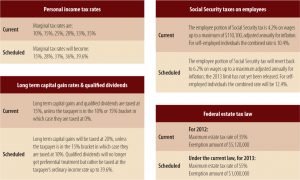Coordination of a solid financial plan must incorporate provisions for taxes and strategies for mitigating unnecessary tax missteps. The current uncertainty of the tax law, both from expiring provisions, as well as new laws commencing, makes this a difficult task for future planning. There are a few areas of consequence that should be discussed with your advisors in the latter half of 2012.
Expiration of current tax laws & provisions
President Bush implemented tax cuts in 2001 and 2003, and, in late 2010 President Obama extended the cuts through 2012. If nothing is done legislatively those tax cuts will expire in 2013 and tax rates will rise. Consider the highlighted changes in the chart above.
In addition to these scheduled changes, many credits and deductions will go away or revert back to significantly lower income limitations.
Commencement of new tax laws & provisions
Starting in 2013 the first new taxes resulting from The Patient Protection and Affordable Care Act signed in 2010 will take effect. Listed below and on the following page are the specific tax measures scheduled to be imposed and the resultant implications to certain categories of taxpayers:
- Additional Hospital Insurance Tax on High-Income Taxpayers (HI): A surtax on high wage earners. An additional 0.9% will be paid on earned income over: $250,000 for married individuals filing joint returns; $200,000 for single and head of household filers; and $125,000 for married individuals filing separate returns.
- Unearned Income Medicare Contribution Tax: A surtax on taxpayers with high amounts of passive income. An additional 3.8% will be paid on the lesser of net investment income or the excess of adjusted gross income over: $250,000 for married individuals filing joint returns; $200,000 for single and head of household filers; and $125,000 for married individuals filing separate returns.
- Medical Expense Deductions: Medical expenses deducted on schedule A as an itemized deduction will have to exceed 10% of adjusted gross income beginning in 2013. This is an increase from 7.5%.
What discussions should I be having with my advisors?
Review your portfolio with your advisors and determine if realizing long term capital gains in 2012 will allow you to take advantage of a 5% tax benefit before year-end. There are no adverse tax consequences to selling a position at a gain and immediately repurchasing the same position. Keep in mind that if you repurchase the position you will need to have available cash flow to cover the tax liability.
Consider income deferral methods. This can be as simple as making sure to contribute the maximum to your 401(k) at work; or, if you are a business owner be sure you have the most advantageous retirement plan for you given your business structure.
New legislation can be passed between now and the end of the year that may extend, adjust, or repeal any of the above topics discussed. Make sure to contact your tax advisor or wealth manager about a plan of action since they will have current information as it becomes available.
[author] [author_image timthumb=’on’]https://sensenigcapital.com/wp-content/uploads/2012/08/nick-boxter.jpg[/author_image] [author_info]Nicholas A. Boxter Nicholas has 10 years of experience as a staff accountant at his family owned firm in Whitehouse, New Jersey. The firm has over 35 years of extensive experience assisting clients with individual and corporate tax matters, including federal and state tax returns, corporate, subchapter S, partnership, and LLC tax concerns. In addition, his firm assists clients with tax matters involving estate and inheritance tax, fiduciary tax returns, gift tax issues, and tax planning for college, retirement, and death. Click here.[/author_info] [/author]



